michele bachmann
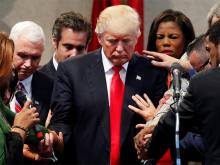
“God raised up, I believe, Donald Trump,” said former U.S. Rep. Michele Bachmann after he won the GOP nomination. “God showed up,” the Rev. Franklin Graham said to cheers at a post-election rally. “God came to me, in a dream last night, and said that Trump is his chosen candidate,” said the televangelist Creflo Dollar.
For those who share this view, Trump’s victory was nothing short of miraculous, especially given that he beat out 16 other in the Republican primaries — some of them evangelical Christians with long political resumes.
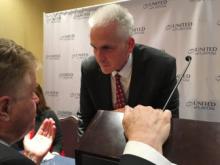
Donald Trump’s flagging presidential bid is enjoying a boost of that old-time religion after conservative Christian leaders gave the candidate high praise and standing ovations at a critical closed-door meeting that one observer described as a “campaign rally.”

Mr. Trump, you had a meeting today and invited almost 1,000 Christians to it. From the reports so far, the people you asked to come were overwhelmingly white, old, evangelical, conservative men. There were lots of other evangelicals that you didn’t invite — even some old, white, evangelical men like me — who have raised questions that you have yet to answer. In my opinion, you should have invited more black, brown, young evangelical women and men, from a broader spectrum of political perspectives; I imagine you would have been asked some better questions.
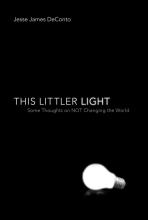
When I was seven years old in the mid-‘80s, Mom started taking my brother Marco and me to Grace Bible Baptist Church and School in rural New Hampshire. We’d pass by all these well-attended, high-steepled liberal churches to worship in a squat, utilitarian building hidden on a back road in the woods, with a congregation of 30 or 40 strong: The Moral Majority. U.S. Rep. Michele Bachmann’s recent claim that we’re living in the end times reminds me of those days. We were the pre-party to the Tea Party. There were Ronald Reagan posters in the lobby. We’d listen to sermons about “back masking” and the Satanist propaganda you’d hear if you played rock records backwards. One week, we came back to church every night after school to watch Russell Daughten’s four-part 1970s Rapture movie series, the original Left Behind: Polyester pandemonium.
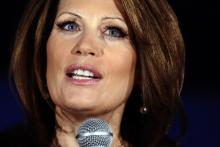
On Wednesday, 42 interfaith religious and advocacy organizations signed on to a letter condemning Rep. Michele Bachmann and others in Congress for their accusations that the Muslim Brotherhood had infiltrated the U.S. government.
The claims — one aimed at Sec. Hillary's Clinton aideHuma Abedin — have also been condemned by members on both sides of the aisle. One of the most impassioned defenses of Abedin came from Sen. John McCain (R - Ariz.), saying, "When anyone, not least a member of Congress, launches specious and degrading attacks against fellow Americans on the basis of nothing more than fear of who they are and ignorance of what they stand for, it defames the spirit of our nation, and we all grow poorer because of it.”

WASHINGTON, D.C. — Accusations by Rep. Michele Bachmann, R-Minn., that an Islamist group has infiltrated the U.S. government are drawing fierce criticism from fellow lawmakers and religious groups.
Bachmann and four other GOP legislators have sent letters to five government agencies citing "serious security concerns" about what Bachmann has called a "deep penetration in the halls of our United States government" by the Muslim Brotherhood.
Bachmann also accused Huma Abedin, an aide to Secretary of State Hillary Rodham Clinton and former Rep. Anthony Weiner's wife, of having family connections to the Muslim Brotherhood.
Sen. John McCain, R-Ariz., defended Abedin. "These attacks on Huma have no logic, no basis and no merit, and they need to stop now," he said in a Senate speech on Wednesday.
Bachmann's letters cite a report by Frank Gaffney, a conservative who has accused President Obama of "embracing the agenda of the Muslim Brotherhood."
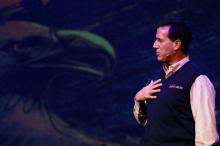
With the Iowa caucus, the "First in the Nation" New Hampshire primary, and South Carolina's primary now behind us, the field of contenders for the Republican nomination continues to shrink. I've watched with great interest as the spectacle rolls on and a parade of non-Romney's (Non-Roms, going forward) rhythmically rise and fall. What is perhaps most interesting about the current frontrunners is the lack of an obvious evangelical candidate. For all the talk that we hear about the importance of the evangelical vote, one would suspect at least one of the potential nominees to be, you know, an evangelical.
But Michele Bachmann is out of the race after a promising start in the Iowa straw poll. Perry, whose entrance into the race as a more "electable" evangelical candidate may have contributed to Bachmann's quick downfall, all but eliminated himself in a number of now infamous debate flops. That leaves one not particularly religious Baptist, two Roman Catholics, and a Mormon. Rick Santorum, a Catholic, is perhaps the most socially conservative and thus the most evangelical-looking of the Non-Roms, but many evangelicals have a deep mistrust of Catholics, so it is doubtful that, as they did in Iowa, evangelicals will support him despite his Catholicism.
So what happened here? Back in 2004, when talking about the evangelical vote was all the rage, one could presume that evangelicals were a unified political front—that denominations or non-denominations within evangelicalism didn't matter, theological differences were moot, and ending abortion was enough to tie them all together. The problem with this presumption is that it was never true. There was never one kind of evangelical. If there was, self-identified evangelicals wouldn't have to add a definition or disclaimer every time they identify as such.
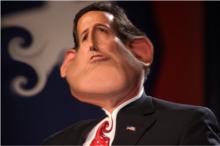
The results of the Iowa Caucus are in. Romney edged it out with 8 votes over Santorum. Ron Paul came in third and then Gingrich, Perry and Bachmann came in fourth, fifth and sixth respectively.
It’s a stretch, but remember when Bachmann was the candidate to beat? How about Perry? Cain? Gingrich was just a few weeks ago. Ron Paul was at the top of the polls for a moment Iowa.
Santorum has now shot up in prominence with his close second finish but some observers are arguing that the only reason why he is up is that he hasn’t been vetted yet. (On Wednesday, "Rick Santorum" was the second-most popular search on Google after "Iowa caucus.")
Why all of the ups and downs?
After a poor performance last night’s Iowa Caucus — with a sixth place finish and only 6 percent of the evangelical vote — U.S. Rep. Michele Bachmann announced earlier today that she is suspending her campaign for President of the United States.
Watch video of her announcement inside...
“Oh my God” was the refrain that kept going through my mind as I watched the Republican presidential candidates talk about their positions on foreign policy at their debate over the weekend.
I did not expect the surprises that I heard. At least two candidates supported torture, saying it was necessary to acquire acquire information to protect America.
Oh my God.
 Most of my friends knew evangelicalism only through the big, bellicose voices of TV preachers and religio-political activists such as Pat Robertson, the late Jerry Falwell and James Dobson. Not surprisingly, my friends hadn't experienced an evangelicalism that sounded particularly loving, accepting or open-minded.
Most of my friends knew evangelicalism only through the big, bellicose voices of TV preachers and religio-political activists such as Pat Robertson, the late Jerry Falwell and James Dobson. Not surprisingly, my friends hadn't experienced an evangelicalism that sounded particularly loving, accepting or open-minded.
After eschewing the descriptor because I hadn't wanted to be associated with a faith tradition known more for harsh judgmentalism and fearmongering than the revolutionary love and freedom that Jesus taught, I began publicly referring to myself again as an evangelical. By speaking up, I hoped I might help reclaim "evangelical" for what it is supposed to mean.
Over the past few weeks various news outlets have run stories on the so-called feminism of Sarah Palin and Michele Bachmann. Typical of the media, in order to make that claim, they, of course, had to assume that any woman doing anything in public equals some sort of feminist revolution. It is, however, a rapidly spreading idea. If the concept of successful women must be blamed on feminist action, then successful conservative women must be the result of feminism as well. Granted this new definition of "feminist" is, as Lisa Miller wrote for the Washington Post, "a fiscally conservative, pro-life butt-kicker in public, a cooperative helpmate at home, and a Christian wife and mother, above all." But apparently it's still feminism.
While many from the left were outraged by the idea of associating these arch-conservatives, who stand against many of the things historical feminists have supported, with feminism, others supported the idea. Naomi Wolf, who seems to have a love/hate relationship with feminism, wrote that the problem some have with calling those women feminists is that we don't understand the history of feminism. She argues (rightly in my opinion) that feminism has only become associated with leftist agendas since the 1960's, but was, in its origins, more balanced and open to conservative values. But then she explains her reasoning why: